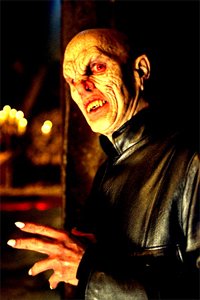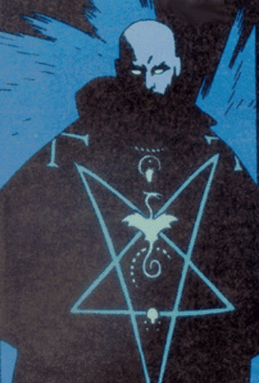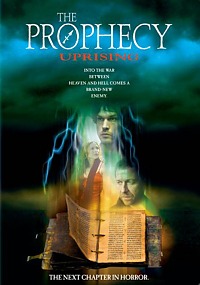
In religion, a prophet or prophetess is an individual who is regarded as being in contact with a divine being and is said to speak on behalf of that being, serving as an intermediary with humanity by delivering messages or teachings from the supernatural source to other people. The message that the prophet conveys is called a prophecy.

Völuspá is the best known poem of the Poetic Edda. It tells the story of the creation of the world and its coming end and subsequent rebirth, related to the audience by a völva addressing Odin. It is one of the most important primary sources for the study of Norse mythology. The poem is preserved whole in the Codex Regius and Hauksbók manuscripts while parts of it are quoted in the Prose Edda.

In religion, a prophecy is a message that has been communicated to a person by a supernatural entity. Prophecies are a feature of many cultures and belief systems and usually contain divine will or law, or preternatural knowledge, for example of future events. They can be revealed to the prophet in various ways depending on the religion and the story, such as visions, divination, or direct interaction with divine beings in physical form. Stories of prophetic deeds sometimes receive considerable attention and some have been known to survive for centuries through oral tradition or as religious texts.
Celebrimbor is a fictional character in J. R. R. Tolkien's legendarium. His name means "silver fist" or "hand of silver" in Tolkien's invented language of Sindarin. In Tolkien's stories, Celebrimbor was an elven-smith who was manipulated into forging the Rings of Power by the Dark Lord Sauron, in fair disguise and named Annatar. Sauron then secretly made the One Ring to gain control over all the other Rings and dominate Middle-earth, setting in motion the events of The Lord of the Rings.
Belgarion is a fictional character and the chief protagonist in The Belgariad and The Malloreon, two fantasy epics written by David Eddings.

The Master is a fictional character on the action-horror/fantasy television series Buffy the Vampire Slayer (1997–2003). He is a centuries-old vampire portrayed by Mark Metcalf, determined to open the portal to hell below Sunnydale High School in the fictional town of Sunnydale where the main character Buffy Summers lives. The premise of the series is that Buffy is a Slayer, a teenage girl endowed with superhuman strength and other powers, which she uses to kill vampires and other evil beings. Each season of the series Buffy and the small group of family and friends who work with her, nicknamed the Scooby Gang, must defeat an evil force referred to as the Big Bad; the villain is usually trying to bring on an apocalypse. The Master is the first season's Big Bad.

Jacqueline A. Carey is an American writer, primarily of fantasy fiction.
Mystra is a fictional goddess in the Forgotten Realms campaign setting for the Dungeons & Dragons fantasy role-playing game.
Kushiel's Legacy is a series of fantasy novels by American writer Jacqueline Carey, comprising the Phèdre Trilogy and the Imriel Trilogy. Since the series features a fictional version of medieval Western Europe, it can be considered historical fantasy or alternate history.
Awen is a Welsh, Cornish and Breton word for "inspiration".

Mjolnir, known more formally as Mjölnir is a fictional magical weapon appearing in American comic books published by Marvel Comics. It is depicted as the principal weapon of the superhero Thor. Mjolnir, which first appears in Journey into Mystery #83, was created by writers Stan Lee and Larry Lieber and designed by artists Jack Kirby and Joe Sinnott.

Fanaa in Sufism is the "passing away" or "annihilation". Fana means "to die before one dies", a concept highlighted by famous notable Persian mystics such as Rumi and later by Sultan Bahoo. There is controversy around what Fana exactly is, with some Sufis defining it as the absolute annihilation of the human ego before God, whereby the self becomes an instrument of God's plan in the world (Baqaa).
Venus is the name of two fictional characters appearing in American comic books published by Marvel Comics. The first, originally based on the goddess Venus (Aphrodite) from Roman and Greek mythology, was retconned to actually be a siren that only resembles the goddess. The second is stated to be the true goddess, who now wishes only to be referred to by her Greek name, Aphrodite. The similarities between the two characters are a point of conflict in the comics.

Grigori Yefimovich Rasputin is a fictional supervillain in the comic book series Hellboy. The character was created by Mike Mignola and John Byrne, and was based on the real life Russian mystic of the same name. Rasputin serves as the second archenemy of Hellboy after the Ogdru Jahad.

The Prophecy: Uprising is a 2005 fantasy-action-horror-thriller film and the fourth installment in The Prophecy series. This chapter does not feature series regular Christopher Walken, instead starring Doug Bradley, British actor Sean Pertwee, and frequent horror film actress Kari Wuhrer in the lead roles.

Dyosa (transl. Goddess) is a Philippine fantasy series (fantaserye) on ABS-CBN and starred by Anne Curtis, Sam Milby, Zanjoe Marudo and Luis Manzano and was directed by Wenn V. Deramas. It aired from August 11, 2008 to January 16, 2009, replacing Lobo and was replaced by Tayong Dalawa.
The Silmarils are three fictional brilliant jewels in J. R. R. Tolkien's legendarium, made by the Elf Fëanor, capturing the unmarred light of the Two Trees of Valinor. The Silmarils play a central role in Tolkien's book The Silmarillion, which tells of the creation of Eä and the beginning of Elves, Dwarves and Men.

Zeus is a fictional deity in the DC Comics universe, an interpretation of Zeus from Greek mythology. His appearances are most significant in stories of Wonder Woman. With the 2011 relaunch of DC Comics dubbed The New 52, Zeus has received a prominent role in the Wonder Woman mythos, as he is now the biological father of Wonder Woman through Hippolyta.

Dream Chronicles, first released in 2007, is a series of adventure, hidden object and puzzle casual games. It was created by Miguel Angel Tartaj for KatGames and published by PlayFirst. It's also the name of the first game in the series.











